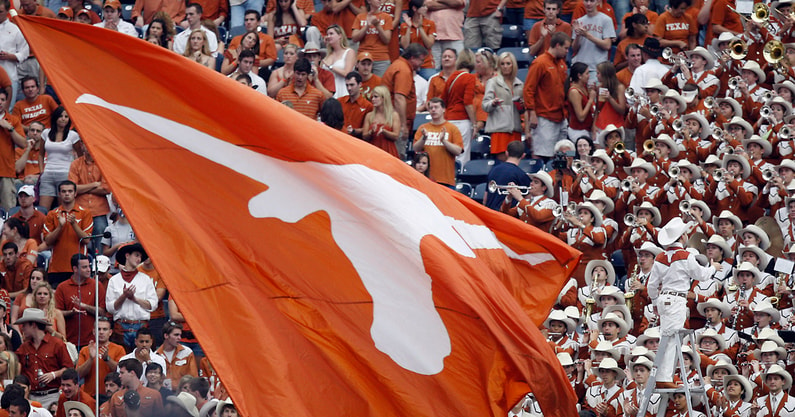Texas bill could provide schools protection from NIL-related violations

In early April, the Oklahoma House of Representatives overwhelmingly passed Senate Bill 840 by a vote of 84-5. The bill drew national attention because it included a section that appeared to provide cover for Oklahoma, Oklahoma State, Tulsa and other state schools from being punished by the NCAA for any NIL-related violations, including any committed by collectives that have been set up to support student-athletes through deal facilitation.
Fast forward a few weeks and now a similar bill – House Bill 2804 – is making its way through the Texas House of Representatives.
The NIL-focused legislation is similar to Texas Senate Bill 1784. But NIL legal observers noticed a subtle, yet, significant change that was added last week after HB 2804 moved through the Texas House Committee on Higher Education, which is chaired by bill sponsor Rep. John Kuempel.
According to the revised bill: “An athletic association, an athletic conference, or any other group or organization with authority over an intercollegiate athletic program at an institution to which this section applies may not enforce a contract term, a rule, a regulation, a standard, or any other requirement that prohibits the institution from participating in intercollegiate athletics or otherwise penalizes the institution or the institution ’s intercollegiate athletic program for performing, participating in, or allowing an activity required or authorized by this section.”
Texas NIL bill appears similar to Oklahoma’s
Coaches and NCAA leaders say NIL sometimes disguises “pay-for-play” deals choreographed by collectives ahead of when student-athletes sign binding national letters of intent or before they enter the Transfer Portal. Per NCAA rules, boosters can’t pay players directly or be part of the recruiting process, and the organization says it is actively investigating multiple bad actors in the NIL space.
There are more than a dozen active NIL collectives in the Lone Star State, headlined by the Texas One Fund at Texas and The 12th Man+ Fund at Texas A&M. Yet, there are a handful of other wildly successful collectives in Texas, including Houston’s Hoop And Holler, TCU’s The Flying T Club, SMU’s Pony Sports DTX and Boulevard Collective and Texas Tech’s Dark Horse Collaborative and The Matador Club. Heck, even the Runners Rising collective at UTSA has played a significant role in roster retention and supporting numerous student-athletes.
Dan Greene, an associate attorney at Newman & Lickstein in Syracuse, N.Y., said competition is been a driving force behind NIL laws that have been reshaped across the country.
“This situation is no different and is not surprising considering the major sports rivalries between Texas and Oklahoma,” Greene said. “Perhaps other states will consider adding similar language to its NIL bill, which would put additional pressure on the NCAA, since these additions to the respective NIL bills are an affront to the NCAA.”
Top 10
- 1Breaking
Rivals x On3
On3 acquires Rivals
- 2Hot
Paul Finebaum
Josh Heupel job security
- 3Trending
Bill Belichick
CBS News fires back at UNC coach
- 4
Jordan Travis
Retires from football
- 5
Ian Schieffelin
Joining Clemson football team
Get the On3 Top 10 to your inbox every morning
By clicking "Subscribe to Newsletter", I agree to On3's Privacy Notice, Terms, and use of my personal information described therein.
John Holden, an associate professor at Oklahoma State that specializes in the rights of student-athletes, told On3 he also wasn’t surprised by Texas lawmakers changing their proposed NIL legislation.
“Effectively, I think we are seeing states follow the lead of Oklahoma,” Holden said. “Much like with California leading the charge on NIL back a few years ago, which set Florida and Nebraska and a dozen other states running, no one wants to be on the outside looking in. States are going to keep pushing until the NCAA pushes back. Even then someone might be willing to go to the wall.”
What will the NCAA’s reaction be?
Holden said when California passed its law, some experts suggested that it might run afoul of the Dormant Commerce Clause, a constitutional principle that “prohibits undue burdens on interstate commerce, and there is certainly a possibility that someone might view these bill with similar skepticism.”
Holden and Greene are unsure what the reaction will be from the NCAA, especially if other states don’t enact similar laws. Currently, there’s a patchwork of NIL laws in places across the country. Some are more restrictive than others. But there’s been a trend lately over the past year to give student-athletes more flexibility and allow schools and athletic departments to become more engaged in NIL dealings.
“I assume that the NCAA is aware of these developments, so it will be important to see how they react,” Greene said. “Will they try to fight this? Or, will they try to use it to their advantage by using these developments as reasons why federal NIL legislation is needed?”